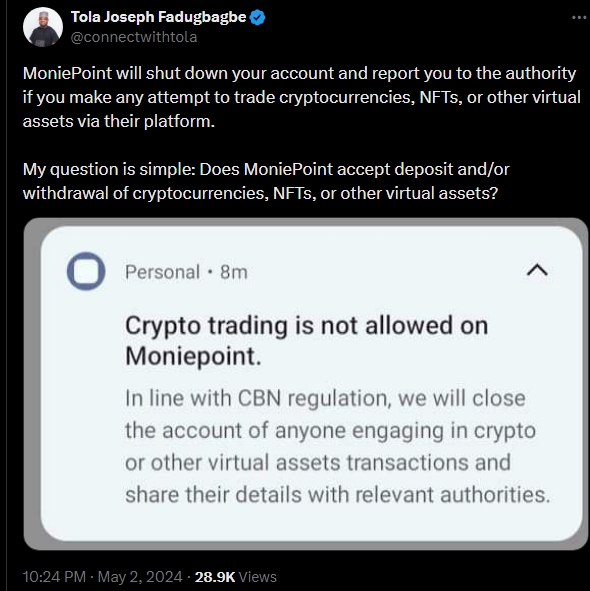Inconsistent in recent years, the Nigerian central bank has adopted a stance on cryptocurrencies; the crackdown contradicts a 2021 decision to facilitate the opening of cryptocurrency accounts
Certain Nigerian fintech platforms have issued advisories to users in light of the nation’s ongoing efforts to regulate cryptocurrencies. These advisories caution users against using their accounts for crypto transactions or the imposition of severe sanctions.
Customers of Nigerian fintech companies Paga, PalmPay, Moniepoint, and PalmPay have been informed that their accounts will be blocked if they conduct cryptocurrency transactions with the companies.
This follows an order from the Central Bank of Nigeria (CBN) to cease onboarding new customers by certain new institutions, including Moniepoint.

As stated in the communication distributed to clients on May 2, 2024, Moniepoint
“In accordance with CBN policy, we shall terminate the accounts of all users involved in cryptocurrency or other virtual asset transactions and disclose their information to the appropriate authorities.”
This announcement contradicts the CBN’s prior declaration that it would remove the cryptocurrency ban it implemented in 2021.
The central bank instructed financial institutions to facilitate account opening, offer designated settlement services, and serve as intermediaries for firms involved in crypto asset transactions, as stated in the CBN circular published in December 2023.
Additionally, the December circular stated that it supersedes the regulations from 2017 and 2021 that prohibited financial institutions and banks from operating cryptocurrency service provider accounts.
A PalmPay customer and X user reported that his account had been suspended and could only be unfrozen by signing an agreement requiring him to refrain from engaging in cryptocurrency transactions.

Additionally, Paga informed clients via email that it is licensed by the CBN and is dedicated to adhering to all regulations:
“We wish to remind you, in accordance with the CBN circular reference FPR/DIR/GEN/CIR/06/10, that it is unlawful to engage in or facilitate transactions involving cryptocurrency and other virtual currencies.”
Paga cites a 2017 circular that cautions financial institutions and banks regarding their interactions with cryptocurrency exchanges and clients who conduct cryptocurrency transactions.
Previously, the CBN refuted a report that it had issued a directive mandating that all banks and financial institutions identify entities or individuals conducting transactions with cryptocurrency exchanges and place such accounts on “Post No Debit” instruction for six months.
“Post No Debit” instruction refers to a directive issued by a financial institution to restrict specific transactions on a customer’s account.
Additionally, the circular prohibited regulated financial institutions from engaging in cryptocurrency transactions or facilitating payments for cryptocurrency exchanges.



